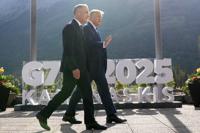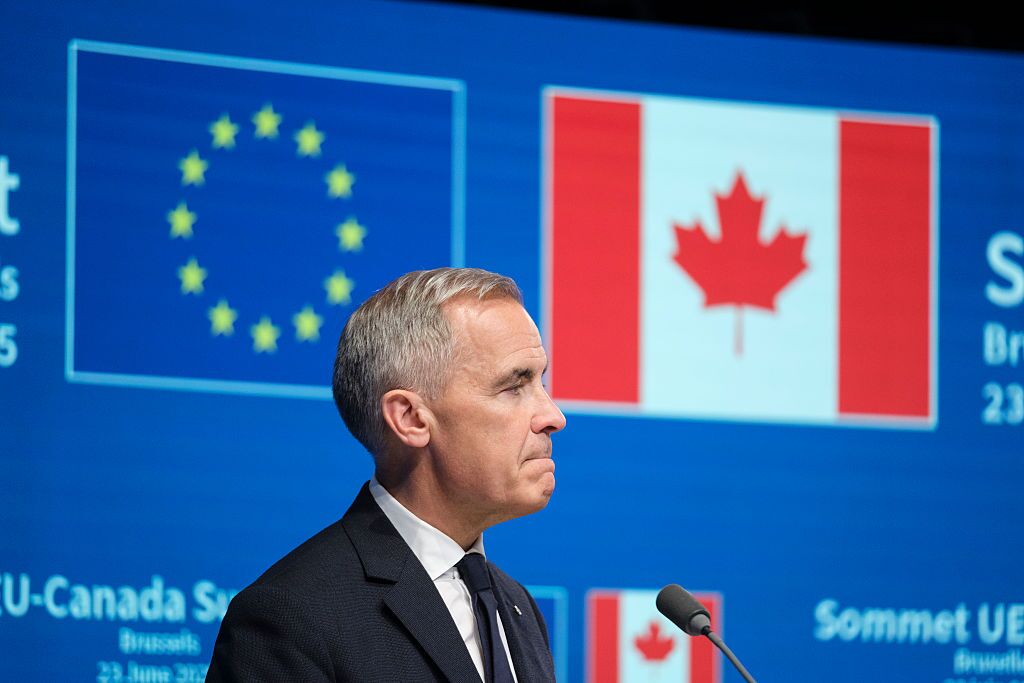As “the world (watches) in horror as a sovereign and democratic country is violently invaded by one of the most powerful armies on the planet, … Canada’s hypocrisy (is) on full display,” according to Ricochet contributor Brandi Morin.
While emphasizing that “Russia’s bombing of Ukraine is unquestionably wrong,” she contends that Canada is “guilty of human-rights violations within its own borders” — specifically, in northern British Columbia, where the “invasion of Wet’suwet’en territory” has been underway for years.
The “mountainous wildland where Wet’suwet’en people have walked for millennia … has never been ceded,” she notes. “But Canada and the province of British Columbia claimed it for their own after establishing a colonial dynasty of domination.”
Since then, “the hungry beast of colonialism has continued its relentless destruction by way of industrial development, and the razing of Indigenous lands for pipelines supporting exports to foreign countries,” she writes.
“When they fight back for their lands, waters, and right to exist, they’re met with armies of federal police, (but) the land defenders, like the people of Ukraine, stood their ground.”
Given all that, she’s “rooting for Ukraine, because they have every right to exist as a sovereign nation and defend themselves from the tyrannies of evil.
“The question that remains is why Canada allows this ongoing war against Indigenous Peoples? If Canada supports the sovereignty of Ukraine and the freedoms of democracy, it should ditch the double standards and support the Wet’suwet’en and other sovereign Indigenous Nations’ right to exist.”
Over at The Breach, Dru Oja Jay notes that the invasion of Ukraine has “created major military escalations, rapid realignments resembling a new cold war, and a bonanza for arms dealers” that could include increased defence spending in Canada.
“Arms dealers are … a highly effective political force” in Ottawa, he writes.
“An outsized presence on Parliament Hill, they employ a phalanx of retired military commanders, backed by highly trained former bureaucrats familiar with the inner workings of government. The total number varies, but registries show hundreds,” and they “don’t stop at lobbying for military contracts; rather, they seek to shape the policy priorities to fit the wildly expensive equipment they are hawking.”
Elsewhere on the site, fellow Breach contributors Dawn Marie Paley and Justin Brake examine how, even as “solidarity with Ukrainians flourishes” across Canada, “cherished colonial narratives (that) conceal the violent history of settler colonialism, and undermine efforts (to decolonize), are being challenged.”
Furthermore, “some have questioned contradictions in Canada’s support for Ukraine while actively occupying Indigenous lands, only to be met with accusations of ‘whataboutism’ — a rhetorical device sometimes used to deflect legitimate criticism,” write Paley and Brake.
Over at Rabble, Karl Nerenberg begins his latest dispatch with a stark four-word declaration: “Michael Ignatieff scares me.”
More specifically, he’s sounding the alarm over an opinion piece the former federal Liberal leader recently wrote for the Globe and Mail on the invasion of Ukraine, which includes a “truly scary take” on the possible use of nuclear weapons.
Ignatieff “starts by underscoring the fear that Putin himself might be tempted to use Russia’s considerable stockpile of nuclear weapons, (but) crosses a line when he addresses the possibility of Putin invading a NATO-member country such as Poland or Latvia,” Nerenburg contends.
“If Putin were foolhardy enough to undertake such an invasion, Article 5 of the NATO Treaty would oblige all alliance members to come to their fellow member’s aid,” and, according to Ignatieff, “NATO’s response should not be limited to conventional, non-nuclear weapons, (but) should, if push came to shove, strike first with the catastrophic and deadly force of nuclear bombs and missiles.”
As Nerenberg sees it, “if Putin were to invade a NATO member, the other NATO countries would collectively have the wherewithal to successfully defend their ally with conventional tanks, aircraft, naval vessels, and guns.”
His conclusion: “Using nuclear weapons would not bring victory. It would bring global catastrophe.”
In a separate post, New Democrat MP Bill Blaikie wonders whether the invasion will “revive the debate about nuclear weapons and nuclear energy.”
Russia’s attack on Ukraine “has brought nuclear energy back into the foreground in at least two ways,” he points out.
“Initially, it was brought back by advocates of nuclear energy. They were eager to point out that German dependence on Russian gas exports was a result of an allegedly ill-advised phaseout of nuclear power.”
But, he notes, “a few days is a long time in environmental politics,” and the world was soon “holding its breath at the prospect of a nuclear meltdown at Ukraine’s largest nuclear facility as a result of a fire caused by Russian artillery.”
Given all that, he hopes that, “whatever happens in the coming weeks and months, … recent events will reignite the movement to abolish nuclear weapons and reservations about the wisdom of nuclear energy.”
Meanwhile, Canadian Dimension writer Owen Schalk warns that the escalating sanctions against Russia “are hurting ordinary people in central Asia, (and) hiking the price of staple goods across the Global South.”
In fact, he says, “the supposedly bloodless and ‘targeted’ punishment of sectors of the Russian economy has already had wide-ranging effects on people inside and outside of Russia who have committed no crime, and who simply want the best possible life for themselves and their family.”
Finally, Passage managing editor Davide Mastracci “took a read through Canadian media outlets over the past 10 or so days” to find opinion articles arguing that Canada expand its military for war in Ukraine. He then “reached out to the people (who) wrote the articles, quoted the parts where they called for any of these things, and asked if they’d take part in them.”
(Spoiler alert: So far, two replied to say they would not, although one invited Mastracci to join him on his upcoming trip to Poland to “spotlight the experiences of Ukrainian refugees and their supporters.” Another declined to comment, and the rest have yet to reply.)
On the right-of-centre side of the Canadian activist mediaverse:
- The Rebel’s Alexandra Lavoie chats with former RCMP officer Daniel “Danny” Bulford, who “left his job due to government mandates, … joined the Freedom Convoy as an organizer,” and was eventually “arrested for ‘mischief.’ ”
- Rebel mission specialist David Menzies stops by the Times Square Diner “to ask why they’re still demanding vaccine information from potential customers.”
- Post Millennial contributor John Carpay offers his thoughts on the case against “political prisoner” Tamara Lich, who, despite having been released on bail earlier this week, is “only partly free,” given that her “bail conditions include not protesting, not using social media, and not having anyone post on her behalf.”
- Finally, True North News founder Candice Malcolm talks to Conservative MP Garnett Genuis about his backbench attempt to amend the Canadian Human Rights Act in order to “create federal protections for those fired or harassed by their employers or the government for engaging in a political protest or donating to a political cause.”


